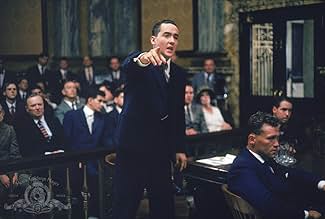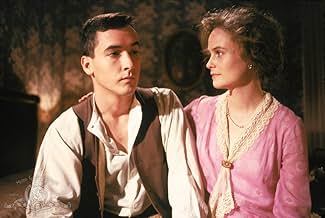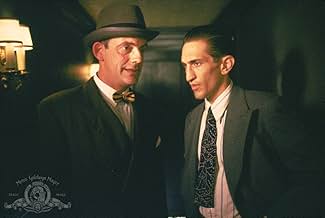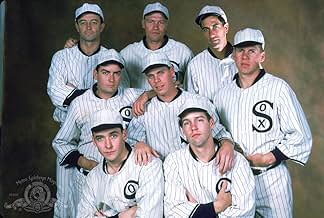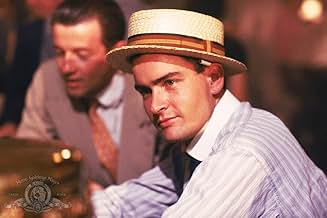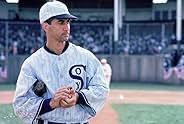Une dramatisation du scandale des Black Sox lorsque les White Sox de Chicago sous-payés ont accepté des pots-de-vin pour perdre délibérément les World Series 1919.Une dramatisation du scandale des Black Sox lorsque les White Sox de Chicago sous-payés ont accepté des pots-de-vin pour perdre délibérément les World Series 1919.Une dramatisation du scandale des Black Sox lorsque les White Sox de Chicago sous-payés ont accepté des pots-de-vin pour perdre délibérément les World Series 1919.
- Récompenses
- 2 nominations au total
- Smitty - The Writers
- (as Jim Desmond)
Histoire
Le saviez-vous
- AnecdotesIn many scenes, players toss their gloves down on the field near their positions before they head to the dugout. Until the 1950s, players frequently left their gloves on the field while at bat. Because of the danger of players stepping on or tripping on them, and batted or thrown balls bouncing off them in odd directions, Major League Baseball requested, then demanded, players to take their gloves with them to the dugout. They finally complied after a rule change and fines.
- GaffesShoeless Joe Jackson signs his confession with an "X". Jackson was illiterate, but he could sign his name by mimicking a pattern. Autographed baseballs and photographs from the time prove it.
- Citations
Buck Weaver: I still get such a bang out of it. Playin' ball. Same as I did when I first come up. You get out there, and the stands are full, and everybody's cheerin'. It's like everybody in the world come to see you. Inside that, there's the players, and they're yakkin' it up. The pitcher throws, and you look for that pill, and suddenly, there's nothin' else in the ballpark but you and it. Sometimes, when you're feelin' right, there's a groove there, and the bat just eases into it and meets that ball. And when that bat meets that ball, and you can just feel that ball just give, and you know it's gonna go a long way, damn, if you don't feel like you're gonna live forever. I couldn't give that up. Not for nothin'.
- Crédits fousThe opening credits are done against a cloudy blue sky, first going up, then to the right, and down to the bottom (kind of like a fly ball). Despite the ensemble cast, the most well-known leading and character actors at the time are credited first in alphabetical order, then lesser known actors that had roles that were just as large or larger are credited in pairs of two. Example: John Cusack, Christopher Lloyd, and Charlie Sheen are credited first, due to their successes with Garçon choc pour nana chic (1985), Retour vers le futur (1985), and Platoon (1986), respectively; however, in pairs, Michael Rooker, Kevin Tighe, and Richard Edson also had pivotal roles, but were lesser known. Sheen already was well-established but had only a few minutes of screen time in the movie, Lloyd and Edson always are together, playing gamblers, but Lloyd was a much more well-known actor and credited first.
- Versions alternativesFive seconds were cut from the British theatrical release in order to obtain a "PG" rating by removing a use of strong language. The film was later released uncut on video and the rating was upgraded to "15", which was subsequently downgraded to "12" for the DVD.
- Bandes originalesI'm Forever Blowing Bubbles
Written by Jaan Kenbrovin (as Jann Kenbrovin) and John W. Kellette (as John William Kellette)
Published by Warner Bros. Music, a division of Warner Bros. Inc.
Used by permission. All rights reserved.
If you forgive the fact the film has to simplify certain aspects of the conspiracy in order to make the film easier to digest, then you will find that Eight Men Out is a worthy film and in the category of "baseball movies" it's one of the best.
There are anachronisms in the film here and there, the worst of which is Buck Weaver's question asking which of the lawyers was the "Babe Ruth" of law. Sure Babe Ruth was coming into his own by 1920, but most ballplayers in that era would not have place Ruth in the class of Cobb, Tris Speaker or Walter Johnson. For baseball fans, this line in particular really comes off as shallow, especially since the rest of the film really tries to capture the "dead-ball" era. For the most part though, this film feels and sounds a lot like America right after World War I ends, a fascinating time and place.
Studs Terkel steals the show in my estimation. His character in the film is not far from whom he is in real life and his authenticity is undeniable. John Sayles is a little stiff by comparison and his singing in the railway car (which according to legend did actually happen), is rather difficult to bear. None the less, his direction makes up for his foibles as an actor.
Straitharn is another gem in this movie, and once again this actor seems to get right to the soul of the characters he is given to play. Eddie Cicotte's dilemmas are written all over Straitharn's face in every scene, he's also given some of the best dialog in the film. Cusack plays his part well, despite the fact that many of his scenes are reduced to clichés. Cusack's best moments are when he is frustrated about his inclusion in the conspiracy trial, despite the fact he gave his all to try and win the series. His outbursts in the courtroom seem perfect, as if drawn from the trial transcripts themselves.
Joe Jackson is given unfair treatment. If "Field of Dreams" mythologizes Jackson to point of hyperbole, "Eight Men Out" plays up his illiteracy with too much of a heavy hand. Joe Jackson wasn't stupid, indeed if you read his last major interview before he died, he speaks about the "Black Sox" with great alacrity and clarity. He was not as ignorant as this film would have you believe. One day someone will produce a film about Joe Jackson, that will portray him accurately, but Eight Men Out is not that film.
Although their roles are very minor, Kid Gleason and Ray Schalk are really well played and written. These two went through a very difficult time during the series, and this is well demonstrated. One minor beef is that Nemo Leibold, Shano Collins and other players outside of the conspiracy are never touched upon at all. This is understandable to a degree given the relatively short length of the film, despite the complexity of the subject matter.
The baseball scenes themselves are well done. The bats, balls, gloves and uniforms look like the equipment of that era and the ballparks are successful mock ups for the most part. There are even a couple of nifty athletic displays in the outfield that must have taken several takes to pull off.
Overall, this is my second favorite baseball movie, next to "Bull Durham". Its a little light on some of the details of the conspiracy, but it makes up for it in other areas. It has some great music, some great sets, some solid acting and overall seems genuine and fair to all the major players in the conspiracy.
Eight Men Out isn't perfect, but it isn't as flawed as Roger Ebert would have you believe. If you a fan of baseball in fact, I'd say its mandatory viewing.
Meilleurs choix
- How long is Eight Men Out?Alimenté par Alexa
Détails
Box-office
- Budget
- 6 100 000 $US (estimé)
- Montant brut aux États-Unis et au Canada
- 5 680 515 $US
- Week-end de sortie aux États-Unis et au Canada
- 1 129 491 $US
- 5 sept. 1988
- Montant brut mondial
- 5 680 515 $US
Contribuer à cette page





